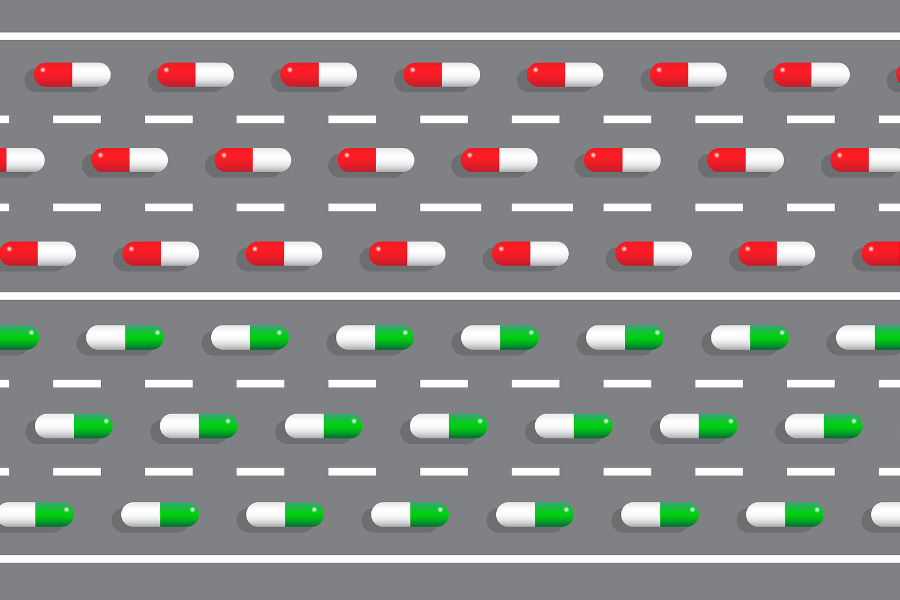
Driving while intoxicated poses a threat to everyone on the road, especially when the intoxicant is an opioid.
The nationwide rise in opioid abuse is having a direct effect on driver safety. A recent article from Addiction Now sites that a Columbia University study has found that “the use of prescription drugs like hydrocodone and oxycodone has increased four times the rate, going from 76 million in 1991 to almost 300 million in 2014.” The data retrieved from the study also showed that the amount of opioids detected in fatal auto accidents has jumped from 1% in 1995 to 7.2% in 2015.
Drug Effects On Driving Ability
Opioid use, whether prescription or not, can impair a drivers ability to properly operate a motor vehicle. Just as with drunk driving or drowsy driving, a person under the influence of opioids poses a major threat to themselves, their passengers, and other vehicles on the road. Accidents caused by opioid intoxication may range from cuts and bruises to permanent disability to death.
Various authorities, including the National Center for Biotechnology Information, have recognized opioids negative effects on drivers. Time of use, dosage, and length of use are factors that play into the level opioids may affect a potential driver. The American Pain Society highly recommends that it is important to monitor the effects a new opioid prescription may have on a patient prior to them ever getting behind the wheel. This practice will give the person a better idea of how opioids affect their ability to operate a motor vehicle and serves as a deterrent to unsafe driving that may lead to an accident.
Prescription vs. Non-prescription
Prescription Drugs
There is a common misconception when it comes to controlled substances that if you have a prescription than the drug is safe. This simply is not true. Prescription painkillers often come in very potent doses. These types of heavy doses can significantly impair a driver, making the driver more likely to get into an accident. Powerful prescriptions in doses can also lead to the type of impairment that makes a regular driver an unsafe driver. Prior to operating your vehicle always consult with your prescribing physician about dosage amounts, the frequency of use, and the duration of use for your prescription. Also, make sure to ask whether the prescription may affect your driving ability or whether there are any side effects related to taking the medication.
Non-prescription Drugs
Non-prescription drugs can either mean over-the-counter medications or street drugs. Generally, opioids are not sold over the counter in America. However, some countries sell less powerful opioids over the counter. For example, Canada allows the sale of Tylenol with Codeine to be sold without a prescription. Other countries such as Mexico allow for the sale of more powerful opioids to be sold without a doctor’s note. The reason this is relevant is because travelers and those living in border states often bring these drugs into the U.S. where they are illegal to possess without a prescription. This practice puts the person smuggling as well as others around them at risk if they decide to drive a car while on the medication.
Illegal Drugs
A street opioid generally refers to heroin. This is arguably the most dangerous of all because of heroin’s high potency. There is also the unpredictability factor that one must take into consideration. There is no ingredients sticker on a street bag of heroin. This thus leaves the user completely unaware of the strength of one bag to the next. Mixing heroin use and driving a vehicle can be a deadly cocktail.
What To Do If You’re Injured In A Car Accident Involving Opioid Impairment
The most important thing to do from a legal perspective is to speak with an experienced Minnesota car accident attorney that can help evaluate whether you have a viable case. Once you determine if you have a case to pursue, it is important that your car accident lawyer immediately begins to investigate your case. This may entail hiring a private investigator, examining the scene of the accident, interviewing witnesses, and contacting insurance companies and their attorneys. The longer you delay the greater the possibility that key facts may slip through the cracks.
Aside from the legal element, be sure to keep up with medical appointments to ensure your recovery. Record a list of all medical appointments and bills, which you may be able to seek compensation for. If you are seeking physical therapy or ongoing treatment for chronic pain, document those visits as well.
See: What to do After a Car Accident Checklist
Why Contact Sand Law for Your Car Accident
The personal injury lawyers at Sand Law have a winning track record of results in car accident matters. You may be entitled to compensation for bills and lost wages, among other damages. To schedule a free consultation with an experienced car accident lawyer call 651-291-7263 or visit us online.

